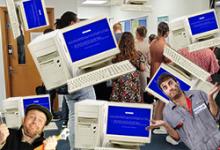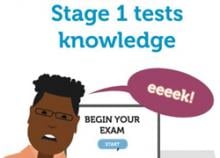
"Well, I read out questions and answers, and nobody has accused me of being outdated and patronising."
The Law Society group representing disabled lawyers has criticised the SRA for barring assistive technology in the Solicitors Qualifying Examination (SQE).
The Law Society's Lawyers with Disabilities Division (LDD), said it came as a "shock and huge disappointment" that disabled students, such as those who are visually impaired or with upper limb issues, would not be allowed commonly used technology (including Jaws, Dragon or Clara Read) for the SQE.
Instead, examination providers Kaplan and the SRA have decided that a dedicated person will read out questions and answers to disabled candidates, at the Pearson VUE test centres, rather than using assistive technology.
Jane Burton, Chair of the LDD, said that having a person reading out "1,440 possible answers" to candidates, was an "outdated method". She said that assistive technology is already used in university exams, as part of "reasonable adjustments" for disabled candidates.
Burton said it was "very unfair" that disabled students will "have to meet with the person assigned to them by Kaplan and practise using this method at the time when they are revising for crucial, life changing exams".
"LDD have been working with the SRA since 2017 to try to help them understand the needs of disabled SQE candidates, although this issue seems to have been too difficult for them to implement," said Burton.
The LDD Chair said she hoped the SRA and Kaplan reconsider their "exclusionary decision and ensure that the necessary technology be accommodated" before the SQE exams start in November.
Professor Debbie Foster, the lead researcher of a project 'Legally Disabled?', told RollOnFriday that she was also "very disappointed" with the announcement.
"The SRA appear to be taking an outdated and patronising approach," said Foster. "It seems obvious that to disallow assistive technology that disabled people themselves are familiar with, will place them at a disadvantage, rather than level the playing field."
An SRA spokesman told RollOnFriday that they were confident their adjustments would be "to a very high standard of provision for those requiring support" for the exams.
For those with visual impairments, "support available includes an individual reading service delivered by someone who is themselves a qualified solicitor," said the SRA spokesman.
"Not only does this provide the benefit that the reader understands the legal text itself, but it also offers the opportunity for candidates to interact with the reader. For example to ask them to repeat something or speak more slowly."
The spokesman said the SRA had "consulted extensively with a range of disability stakeholders" including the LDD. He said they would "continue to investigate a range of assistive technologies", as well as consider all requests for reasonable adjustments on a case by case basis.
Such adjustments could include additional time, a separate room and invigilation, large-print copies of materials provided in printed format, and software such as ZoomText to magnify the text and a variety of different contrast options.
The SRA may wish to just glance over the recent review of the chaotic Bar exams, which found that the Bar Standards Board and Pearson Vue failed to adequately cater for students with visual impairments, by providing an exam platform which did not support assistive technology - the same assistive technology Kaplan has outlawed.














Comments
123
64
Speaking as a person who is severely sight impaired and who works in a aCity Law Firm this just gives yet another signal that the profession I’m part of does not think people with disabilities b are the ‘kind of people who should be doing law’.
i must admit I’ve come across this a lot attitude a lot from certain partners in certain law firms who constantly treated me like I owed them something for the privilege of being let through their office doors and consequently should be grateful to do any kind of work they give me - even if it’s basic and not at all challenging - because I’m disabled.
things need to change, people need to take a look at themselves and their outdated attitude towards disabled people and the SRA should redress this issue as soon as possible.)!!!)6£
78
97
I love instructing lawyers who require a dedicated person to read out questions and answers.
107
64
Absurd that SRA is banning the tech the BSB has just been roasted in an independent review for banning.
Fiver it changes its tune.
62
130
It's a fair stance to take imho - if you can't read and answer a multiple choice exam paper, then do you really have the necessary talents to practice as a lawyer?
I say that with no malice towards the disabled, it's not their fault, but sometimes you do have to look at what God gave you and wonder if maybe some things just aren't for you. So, for example, if you can't read long documents very easily, is law perhaps not the right option? given that it's a career that turns on reading long documents day in day out.
Again, not being discriminatory there, I personally ruled out a career in the NBA on the basis that I wasn't seven feet tall.
67
69
I was kicked out of my partnership at Jones Day for being a drunken sex pest. How is a dipsomaniac, hypersexual sociopath like me ever going to get proper representation in the job market with this kind of discriminatory treatment? Terrible.
85
81
Fair point from 11:57, why are we bending over backwards for people who can't read because they were born with poorly functioning eyes?
Shouldn't we be focusing our efforts on the far larger number of candidates who struggle with reading because they were born stupid and find long words difficult? Don't those peoples' burning wishes to become lawyers count?
Why are they any less deserving than those born with different impairments? Where's their reasonable adjustment to the exam?
73
89
11:06: I'm guessing that the downvotes for your sensible and reality-based post are people expressing their displeasure at you giving up on your NBA dream.
Maybe they could have given you a step ladder or a cherry picker or something.
Stilts, perhaps?
62
68
12:55: You've just described about 75% of the people on my LPC, and a fair number of the people in actual practive, I'd wager.
They seem to cope just fine.
58
69
I fear SQE1 being 100% multiple choice will be too easy. I certainly don't mind technology that helps those who are disabled being used as long as you cannot cheat using it and it does not mean you have it easier than someone without the disability, but overall it does not feel right that the entirely of a 3 year law degree or one year GDL could be examined just via MCQ, no matter how hard they say they are and YES I have some experience living with people doing some GDL work this year which is MCQ - there is no doubt no matter how tricky MCQs are they are easier than complex problems and essay questions in my view. Usually you can discount 2 or 3 of 5 possible answers immediately as clearly not the best answer and then you can almost do a guessing exercise to some extent. Didn't someone who had a PhD in a different subject pass a sample SQE1 exam without any study of law? Hopefully it will be a lot harder this Autumn for the first real SQE1 exams which I think you can sit at any age so some ambitious home schooling parents might be putting 14 year olds in for SQE1 whilst they study for their OU degree in knitting .
64
54
@Shooty - all good ideas.
However, the one I proposed at the time was that I should be allowed to take a special hoop-shooting machine* onto the field of play to allow me to hit three pointers more easily, and then I would get given an extra fifteen minutes at the end of the game in which I could continue to score points while everyone else sat at the side.
They wouldn't permit it though. Less enlightened times.
*A sort of bazooka, but modified so as to fire a continuous stream of basketballs and also mounted on a wheely-tripod.
99
54
Christ - the lot of you commenters could do with a refresher course on the Equality Act couldn’t you?
88
64
11:06: if you can't tell the difference between a disadvantage which is remediable (poor eyesight / assistive technology) and one which is not (short basketball player) you are a ****wit.
How would you feel if you needed glasses to pass the eyesight test for the driving licence, but they told you you had to do it without your glasses just for the heck of it?
77
72
Well that's exactly what I'm saying Anya!
My basketballing shortcomings could easily have been overcome if they'd just let me bring a Ball-Cannon* onto the field with me. All I needed to be as good at basketball as the other players was a complex piece of machinery that could blast rubber balls into the net using highly compressed air.
But those dinosaurs at the NBA just wouldn't make reasonable accommodations for me, would they?
*Patent pending
68
62
only here for the shite South Park takes from private school softboi
98
63
I really do not want to participate in this exchange, but I know that people with disabilities might read it so I feel that I have to. I was a partner of a magic circle firm for 24 years and a silver circle firm for a further 8. I have dyslexia and, since my teens, irreversible hearing decline. For the first half of my career I was hard of hearing and for the last 15 years or so, profoundly deaf, usually requiring someone to relay to me what was said or (in court) livenote. In response to the comments above: (1) Only 2 clients (out of hundreds) ever showed concern over matters being relayed to me, because they appreciated that there is vastly more to being a good lawyer than being able to hear or read quickly. (3) Similarly, I worked with hundreds of lawyers over 30 years. They differed from each other (and from me) in their powers of perception, judgment, organisational ability, creativity, logical thought, team skills, social skills, academic ability and a host of other criteria. All of these required greater acknowledgement or compensation than their ability to see, hear, read or stand up. I cannot think that any of the latter would ever be the deciding factor between them. (4) Reasonable adjustment is not about giving people who lack legal ability a career in law. That would be equivalent to giving a deaf person like me a job as a telephonist. Whether you are disabled or not, you can contact me to discuss this further at https://citydisabilities.org.uk/. Robert Hunter.
91
66
I work in the field of disability inclusion. I am happy to tell you all that I work alongside and mentor lawyers who have varying degrees of both hearing and sight loss. I have also worked with those who live with ADHD and dyslexia, You might be interested to know that they include, judges, barristers, associates, partners and senior partners. I am also a qualified solicitor and am well aware of the demands of the job. They all carry out their job to well beyond the expected standard and represent the most prestigious chambers and magic circle law firms, as well as occupying leading industry roles as in house lawyers. To think that they cannot do those jobs because reading or hearing takes a little longer is a profound mistake, and would suggest that the people commenting otherwise have no actual experience of working alongside colleagues with these differences. More than that, this attitude is a misunderstanding of the whole person. If you have completed legal training and are in work, and have a disability, you will have a whole range of skills that might be untested in others. You will be an excellent problem solver. You will "think outside the box". You will exercise precision and care in your communication. You will be tenacious and hard working. You will have learned to overcome adversity with very little outside help. You will be the person in the room least susceptible to just going along with the group view because there will be no one else like you in the office and so you have never had a herd to follow. I wonder how many of us might benefit from having these skills. A person is more than their disability. A disability might cause a practical issue at work but it also creates a great number of other skills. It's time that we all realised that difference is nothing to be scared of, people thrive in all sorts of unexpected ways, and innovation has never emerged from a room full of people who are the same.
93
60
If you think that something can't be done just because you haven't done it, then that indicates your lack of skill, imagination & capability, not someone else's. Grow up.
78
56
I'm disabled and a solicitor at a US law firm. Disabled solicitors exist and do their job very well, thank you very much. I'll echo what Robert Hunter and Liz Dawes have said: being disabled forces you to think out of the box, be creative, know how to advocate and pick up a whole host of other skills. All of these are competencies that a good solicitor needs.
As Anya pointed out, taking away assistive tech is like telling someone they can't take a test without glasses (a simplified but effective analogy). Assistive tech doesn't give any unfair advantage - it just levels the playing field.